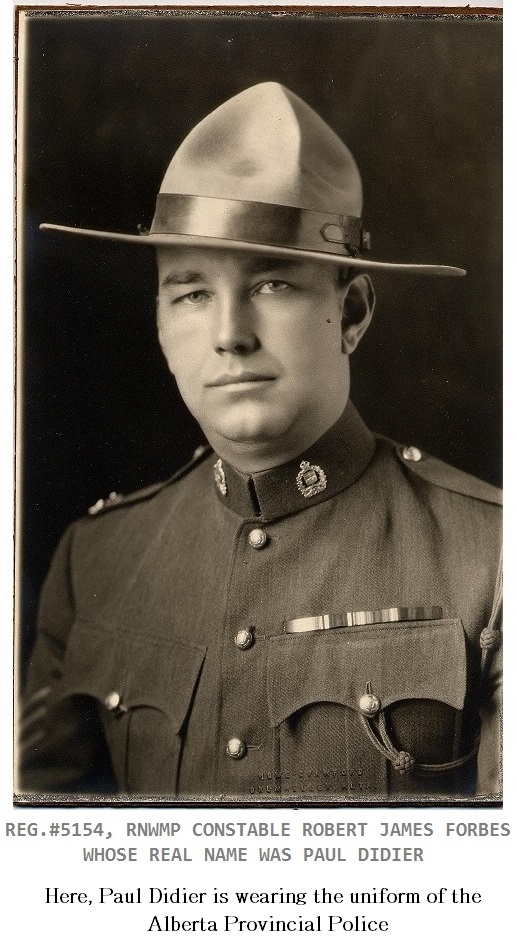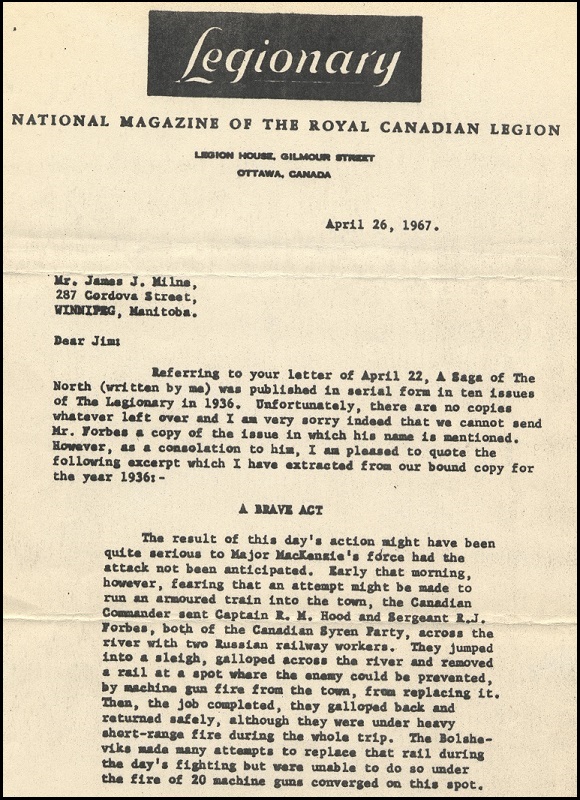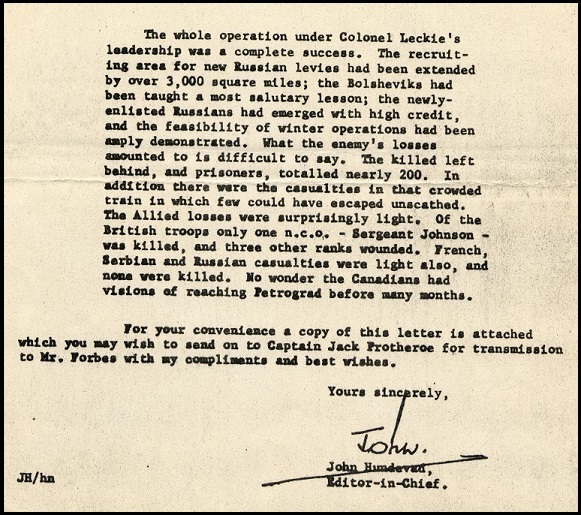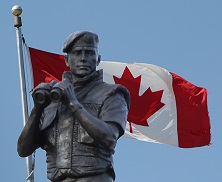True and Fascinating Canadian History

The Mystery Of The Mountie
Once Made A Marine
by J. J. Joe Healy
Was he one or the other or half in between...?
From the earliest days of settling small villages on this side of the Atlantic, America and Canada have been close cousins. Over the years, family ties between the two countries have been strengthened by most politicians and nearly everyone else who has ever worn pants. Everyone the world over knows that Americans and Canadians are friends.
Similarities between the United States and Canada are very apparent in most facets of our society; law, culture, TV, transportation, economics, music, language, dress codes and fashion and so on. All the things that can be matched between the two countries has made for life worthwhile. It also makes for a vibrant ebb and flow by thousands of tourists across the border. It is often said that Americans enjoy the cleanliness of Canada's largest cities and the friendliness of people whomever they meet.
And there are many aspects of American style living which Canadians enjoy too; football, shopping in Manhattan, Broadway, the warmth of the Florida sun, sand and its beaches. And, the American dollar.
And yet, in spite of everything that unites the two countries, there are striking differences in the two worlds most especially when history is read or examined closely. In policing, on the one hand, it is valid to note that a firm marriage has existed between the FBI and the RCMP for one hundred years or more. From their birth, the two organizations have benefited from cultural and legal similarities and the two partners remain close allies today. But, on the other hand, the American west and the Canadian plains were settled in quite stark different ways which becomes evident even with a scant look at modern history.
The popular fall back argument has always been that the entire US Cavalry was required to settle the American West, whereas a Mountie or two were sufficient to transport peace throughout the untamed Canadian territories. Pared down, that’s the historical message that has sold history books and kept them glued together since the beginning. In reality, there likely was much more to history than what's been written here. In the end, however, the whole American - Canadian scene can be summed up like this; nowhere in the world has there ever been two closer neighbours, the two countries come to the aid of each other, disagreements are settled peacefully and one side cannot exist without the other.
But still, there's more to the American Canadian relationship than what has appeared in the history books. In the ‘Mystery of the Mountie Once Made A Marine’, the reader will have to decide whether or not the case could have been settled peacefully. In the day when the case first became exposed, does one suppose that the Americans would have sent in the Marines? Even into Canada? Or, would one Mountie all replenished in red be sufficient to settle the squabble?

There’s no doubt there was tension as a result of the case and some of it was probably created by both sides. Parts of the Mystery were not pleasant. It likely will shock everyone. Yet, there may be a lesson for all of us in the unbelievable yet true 'Mystery of the Mountie Once Made a Marine'.
A study of anatomy has its advantages. Take the neck, for instance. Sure, the neck connects to a pair of shoulders but it also plays a vital role in the conduct or swivel of a person’s head. The more swivel, the more obvious it becomes – and a neck that swivels constantly might be noticeable to a police officer and contribute to his or her success. ‘The Mystery of the Mountie Once Made a Marine’ may have been solved a long time ago, if anyone had taken the slightest notice of Robert Forbes’ neck. But, who would be suspicious of Robert Forbes’ neck if he was himself a police officer?
From the time he was a young boy, Robert James Forbes must have turned his head continuously from side to side looking over his shoulder. For, up until this present day, he hid a very deep secret which was only known to himself, his family and a few others. The few others included the US Marines.
Reg.#5154, Robert James Forbes’ life was marked as adventurous but he was slow to prove himself as an ideal member of the Force. He joined the RNWMP in 1910 and shortly afterwards he deserted. He was arrested, charged with desertion and given a jail sentence accompanied with hard labour.
Forbes’ desertion from the RNWMP was not the first time that he had walked away from a job but so far no one had ever guessed that he had a habit of taking one-way walks whenever a job got too tough. Nevertheless, Forbes must have worked diligently while serving his time because he was allowed to return to police duty before his full sentence had been served. Then, he was transferred to Saskatchewan. Then, he got into trouble again.
Forbes had been posted to Indian Head, SK only a short time when he was involved in an act of mutiny against another member who was acting in authority. His conduct and disobedience was of such seriousness that Forbes was given fourteen days of hard labour again and he was dismissed from the Force as being unsuitable. But, good fortune was riding along with Forbes as WWI was about to get underway.
Upon being dismissed from the Force, Forbes was determined to find a new adventure. He walked across the street and joined the Royal Canadian Horse Artillery. In his new role as a soldier, Sergeant Forbes found himself in the midst of WWI. It was while he was on the front line, that Forbes brought credit to his Unit and to himself.

One day, Forbes was selected by his Commanding officer to accompany Captain R. M. Hood into ememy territory to dismantle a railway line so that it would be made inoperable. The goal of sabotaging the railway line was necessary but very dangerous and Forbes nearly lost his life. The military scheme was successful and it was reported that Forbes was under constant machine gun fire throughout the entire operation.
After WWI, Forbes returned to Canada as a hero. He was free to roam and secrets of his distant past had not been made public. He was determined to continue his adventurous spirit. Once again, he turned his energy towards police work. In 1919, Forbes engaged in the Alberta Provincial Police and he served until 1927. Then, he returned to Regina and served in the Saskatchewan Provincial Police from 1928 until 1932. Afterwards, Forbes retired from law enforcement and moved to western Canada.
From all appearances, Robert Forbes led an exciting time in Canada. His life had come full circle; first the RNWMP, then a successful stint in the Canadian Artillery which was followed by service in the APP and the SPP. But, that was not a full accounting of all his activities. Forbes had a secret – he once had served a previous stint with the US Marines. An incomplete stint.
The secret in Robert James Forbes’ past life has only recently become known and it had everything to do with the United States. In a personal letter, one relative wrote, ‘...My family went to great lengths to keep his story a secret. I assume there was a bounty out for him. I'm not sure his Canadian family knows the truth and I feel a little disloyal telling the story at this point, but my generation is now dwindling. And, while he might not have been well thought of by the Military in the United States, the story of Robert James Forbes, a Canadian, deserves to be remembered.’
Forbes’ American experience happened this way. He had enlisted in the US Marines in 1908 at the age of 17 but quickly found that the Marine Corps did not suit his life style. He deserted the Marines, crossed the border into Canada and lived with his grandfather who was a physician in Tillsonburg, Ontario. Shortly afterwards, he joined the Royal North West Mounted Police, but he lied about his age. His actual date of birth was June 1st, 1892, not 1888 as the historical records show. But that’s not all.
Robert James Forbes was determined to make it difficult for the US Marines to find him in Canada. One way for him to hide was to join the reputable RNWMP. Another way was for him to join the Canadian Armed Forces. Unquestionably, Forbes realized that if he had been located by the US Marines, in all probability, he would have been returned to the United States to face a military court martial and severe punishment.
Yet, Robert James Forbes was never caught. He continued to live in Canada hoping all along that he would never be captured by the US Marines. Forbes added a final twist to ensure that he avoided capture, he used an alias. His real nane was not Robert James Forbes, but Paul Didier.
There was no question that the Americans would have liked to find Forbes and have him stand trial for desertion from the US Marines. On two occasions, he took a gamble and returned to the United States; once after he had been injured in WWI at which time he resided with his mother in Northern Minnesota and a second time in the 1940’s when he travelled into Minnesota for his mother's funeral.
Paul Didier was the central figure in ‘The Mystery of the Mountie Once Made a Marine’ and he may have left us with a lesson about life. The lesson has everything to do with commitment. One does not walk away from one’s responsibility for any reason – whether that responsibility is to the US Marines or to the RCMP. Paul Didier forgot his primary obligation which was to fulfill his contract with the US Marines.
One accepts the pain, suffering and the burden of obligation that goes with the commitment and sticks with it until the job is done. That’s one valuable lesson which we impart to our children. As a very young man, Paul Didier made a terrible mistake in judgement and it haunted him the rest of his life.
While it is true that Forbes proudly served Canada as a soldier especially in time of war, his heroism would have been downplayed with certainty if he had been arrested and returned to the United States. He certainly led a colourful life reflective of his restless personality. He had experiences of which to be both proud and ashamed. Not unlike most of us.
Paul Didier died in 1968. He was cremated and he was buried in Masqui, BC. R. I. P.
'Maintain Our Memories'
From the Fort,
I have the honour to be, Sir
Your Obedient Servant
J. J. Healy





